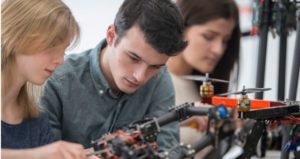
Building Back a Sense of Community and Togetherness with Faculty and Students
In November 2019, I was fortunate to take about 20 of our physics students to the Physics Congress (PhysCon) in Providence, Rhode Island. The conference


In November 2019, I was fortunate to take about 20 of our physics students to the Physics Congress (PhysCon) in Providence, Rhode Island. The conference

Faculty mentorship is widely seen as an important factor in a successful undergraduate education. A recent 2018 Strada-Gallup Alumni Survey, “Mentoring College Students To Success” shows that successful faculty mentorship is critical in encouraging students to pursue their careers and dreams. Yet, only 64 percent of students had a mentor and the number is less for underrepresented groups. As faculty, how can we connect to students outside the classroom beyond merely hoping they show up to office hours?

Universities are strange places. People pay thousands of dollars a year to be taught by supersmart people. These supersmart people are required to do research, write grants, and bring in money and resources to their university. Teaching is only a minor—almost insignificant—part of the job. While this often goes without saying at big R1 universities, it is surprising that this is all too often also true at smaller “teaching” colleges. At my home university, Adelphi, teaching is emphasized, but this is often the exception and not the rule.
Get exclusive access to programs, reports, podcast episodes, articles, and more!